高三第一次月考英语试卷 (4)
- 格式:doc
- 大小:92.46 KB
- 文档页数:9
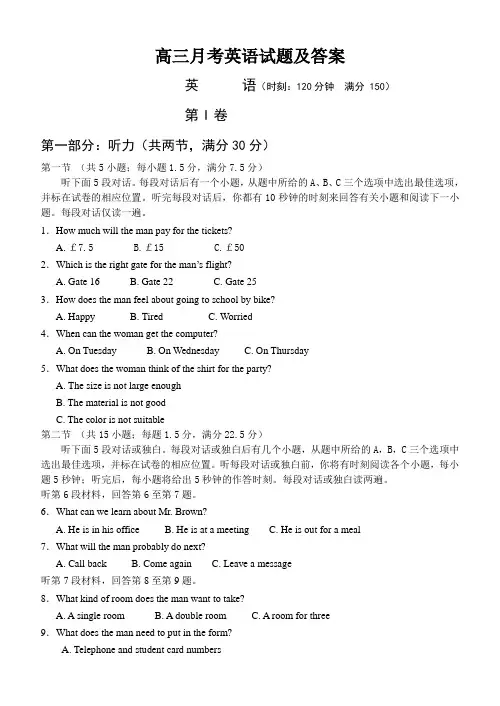
高三月考英语试题及答案英语(时刻:120分钟满分 150)第I卷第一部分:听力(共两节,满分30分)第一节(共5小题;每小题1.5分,满分7.5分)听下面5段对话。
每段对话后有一个小题,从题中所给的A、B、C三个选项中选出最佳选项,并标在试卷的相应位置。
听完每段对话后,你都有10秒钟的时刻来回答有关小题和阅读下一小题。
每段对话仅读一遍。
1.How much will the man pay for the tickets?A.£7.5B.£15C.£502.Which is the right gate for the man’s flight?A. Gate 16B. Gate 22C. Gate 253.How does the man feel about going to school by bike?A. HappyB. TiredC. Worried4.When can the woman get the computer?A. On TuesdayB. On WednesdayC. On Thursday5.What does the woman think of the shirt for the party?A. The size is not large enoughB. The material is not goodC. The color is not suitable第二节(共15小题;每题1.5分,满分22.5分)听下面5段对话或独白。
每段对话或独白后有几个小题,从题中所给的A,B,C三个选项中选出最佳选项,并标在试卷的相应位置。
听每段对话或独白前,你将有时刻阅读各个小题,每小题5秒钟;听完后,每小题将给出5秒钟的作答时刻。
每段对话或独白读两遍。
听第6段材料,回答第6至第7题。
6.What can we learn about Mr. Brown?A. He is in his officeB. He is at a meetingC. He is out for a meal7.What will the man probably do next?A. Call backB. Come againC. Leave a message听第7段材料,回答第8至第9题。
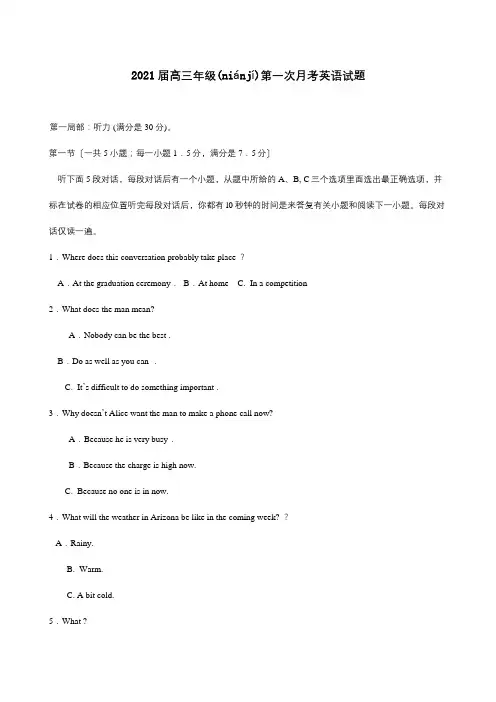
2021届高三年级(niánjí)第一次月考英语试题第一局部:听力 (满分是30 分)。
第一节〔一共5小题;每一小题1.5分,满分是7.5分〕听下面5段对话,每段对话后有一个小题,从题中所给的A、B, C三个选项里面选出最正确选项,并标在试卷的相应位置听完每段对话后,你都有l0秒钟的时间是来答复有关小题和阅读下一小题。
每段对话仅读一遍。
1.Where does this conversation probably take place ?A.At the graduation ceremony. B.At home C. In a competition2.What does the man mean?A.Nobody can be the best .B.Do as well as you can .C. It’s difficult to do something important .3.Why doesn’t Alice want the man to make a phone call now?A.Because he is very busy.B.Because the charge is high now.C. Because no one is in now.4.What will the weather in Arizona be like in the coming week? ?A.Rainy.B. Warm.C. A bit cold.5.What ?A.He is ill.B.He is busy now .C.He is unhappy now.第二节〔一共15小题(xiǎo tí); 每一小题1.5分,满分是22. 5分〕听下面5段对话或者单独。
每段对话或者单独后有几个小题,从每一小题所给的A、B、C三个选项里面选出最正确选项,并标在试卷的相应位置。
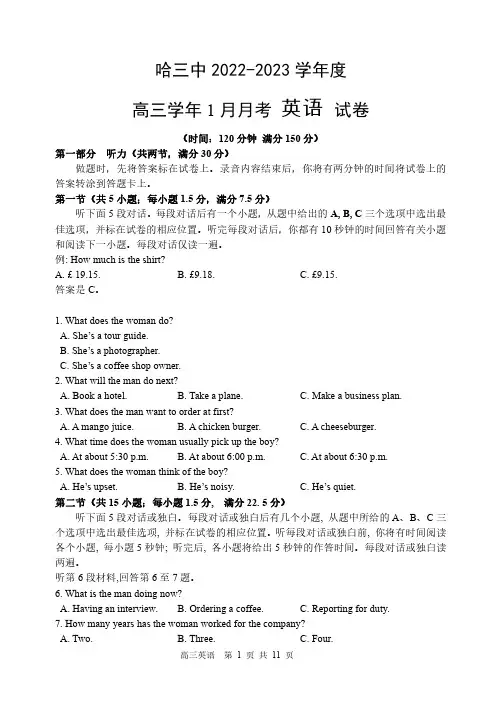
哈三中2022-2023学年度高三学年1月月考英语试卷(时间:120分钟满分150分)第一部分听力(共两节,满分30分)做题时,先将答案标在试卷上。
录音内容结束后,你将有两分钟的时间将试卷上的答案转涂到答题卡上。
第一节(共5小题;每小题1.5分,满分7.5分)听下面5段对话。
每段对话后有一个小题,从题中给出的A,B,C三个选项中选出最佳选项,并标在试卷的相应位置。
听完每段对话后,你都有10秒钟的时间回答有关小题和阅读下一小题。
每段对话仅读一遍。
例:How much is the shirt?A.£19.15.B.£9.18.C.£9.15.答案是C。
1.What does the woman do?A.She’s a tour guide.B.She’s a photographer.C.She’s a coffee shop owner.2.What will the man do next?A.Book a hotel.B.Take a plane.C.Make a business plan.3.What does the man want to order at first?A.A mango juice.B.A chicken burger.C.A cheeseburger.4.What time does the woman usually pick up the boy?A.At about5:30p.m.B.At about6:00p.m.C.At about6:30p.m.5.What does the woman think of the boy?A.He’s upset.B.He’s noisy.C.He’s quiet.第二节(共15小题;每小题1.5分,满分22.5分)听下面5段对话或独白。
每段对话或独白后有几个小题,从题中所给的A、B、C三个选项中选出最佳选项,并标在试卷的相应位置。
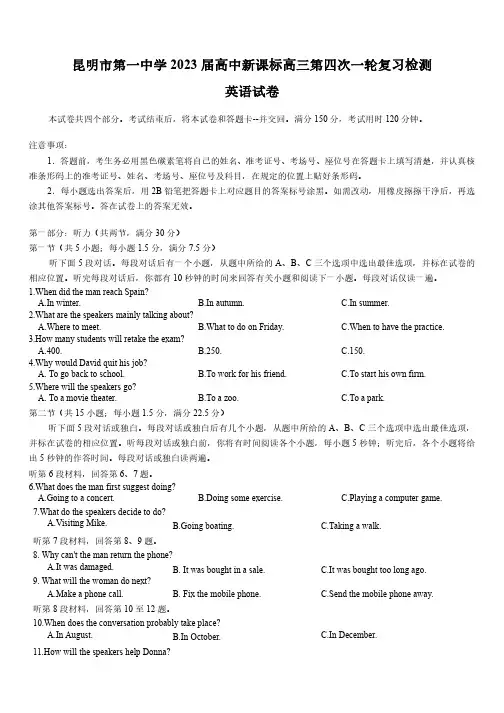
昆明市第一中学2023届高中新课标高三第四次一轮复习检测英语试卷本试卷共四个部分。
考试结束后,将本试卷和答题卡--并交回。
满分150分,考试用时120分钟。
注意事项:1.答题前,考生务必用黑色碳素笔将自己的姓名、准考证号、考场号、座位号在答题卡上填写清楚,并认真核准条形码上的准考证号、姓名、考场号、座位号及科目,在规定的位置上贴好条形码。
2.每小题选出答案后,用2B铅笔把答题卡上对应题目的答案标号涂黑。
如需改动,用橡皮擦擦干净后,再选涂其他答案标号。
答在试卷上的答案无效。
第一部分:听力(共两节,满分30分)第一节(共5小题;每小题1.5分,满分7.5分)听下面5段对话。
每段对话后有一个小题,从题中所给的A、B、C三个选项中选出最佳选项,并标在试卷的相应位置。
听完每段对话后,你都有10秒钟的时间来回答有关小题和阅读下一小题。
每段对话仅读一遍。
1.When did the man reach Spain?A.In winter.B.In autumn.C.In summer.2.What are the speakers mainly talking about?A.Where to meet.B.What to do on Friday.C.When to have the practice.3.How many students will retake the exam?A.400.B.250.C.150.4.Why would David quit his job?A.To go back to school.B.To work for his friend.C.To start his own firm.5.Where will the speakers go?A.To a movie theater.B.To a zoo.C.To a park.第二节(共15小题;每小题1.5分,满分22.5分)听下面5段对话或独白。
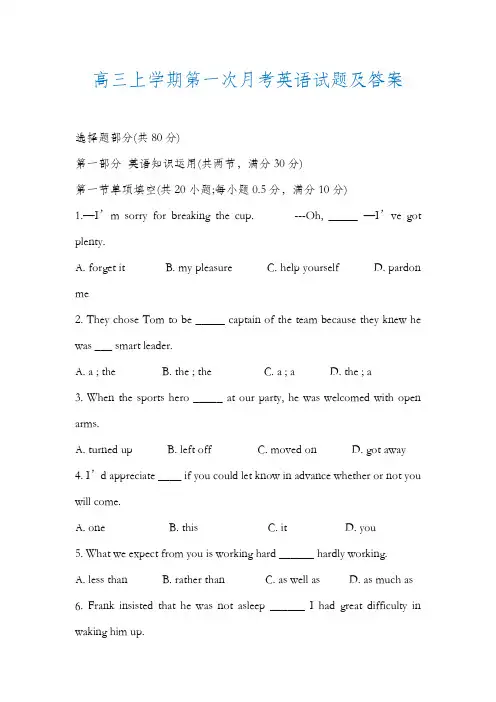
高三上学期第一次月考英语试题及答案选择题部分(共80分)第一部分英语知识运用(共两节,满分30分)第一节单项填空(共20小题;每小题0.5分,满分10分)1.—I’m sorry for breaking the cup. ---Oh, _____ —I’ve got plenty.A. forget itB. my pleasureC. help yourselfD. pardon me2. They chose Tom to be _____ captain of the team because they knew he was ___ smart leader.A. a ; theB. the ; theC. a ; aD. the ; a3. When the sports hero _____ at our party, he was welcomed with open arms.A. turned upB. left offC. moved onD. got away4. I’d appreciate ____ if you could let know in advance whether or not you will come.A. oneB. thisC. itD. you5. What we expect from you is working hard ______ hardly working.A. less thanB. rather thanC. as well asD. as much as6. Frank insisted that he was not asleep ______ I had great difficulty in waking him up.A. forB. whetherC. althoughD. so7. I’ll be out for some time. _____ anything important happens, call me up immediately.A. In caseB. As ifC. Even thoughD. Now that8. Anyway, we’re here now, so let’s ______ some serious work.A. come up withB. do away withC. get down toD. live up to9. You will never gain success ______ you are fully devoted to your work.A. whenB. unlessC. afterD. because10. _____ what you’re doing today important, because you’re trading a day of your life for it.A. MakeB. To makeC. MakingD. Made11. It’s not doing the things we like, but liking the things we have to do ____ makes life happy.A. whoB. whichC. whatD. that12. Clearly and thoughtfully _____, the book inspires confidence in students who wish to seek their own business.A. writingB. to writeC. being writtenD. written13. My parents always _____ great importance to my getting a good education .A. attachB. haveC. acceptD. pay14. English is a language shared by several diverse cultures, _____ uses it differently.A. all of whichB. all of themC. each of themD. each of which15. She drove so fast at the turn that the car almost went _____ the road.A. onB. alongC. offD. from16. Unless some extra money _____ , the theatre will close.A. was foundB. findsC. is foundD. found17. –Can I help you-- I appreciate your _____, but I can manage it myself.A. adviceB. offerC. questionD. idea18. People have always been _____ about exactly how life on earth began.A. excitedB. curiousC. anxiousD. careful19. According to a recent survey, young students’eyesight in China is dropping _____ because of poor learning conditions as well as heavy burden.A. automaticallyB. narrowlyC. sharplyD. roughly20. –Why not stay here a little longer--________, but I really have to go.A. I’d love toB. Never mindC. Pleased to meet youD. I can’t find any reason第二节完形填空(共20小题;每小题1分,共20分)阅读下面短文,掌握其大意,从每题所给的A、B、C、D四个选项中,选出选项。
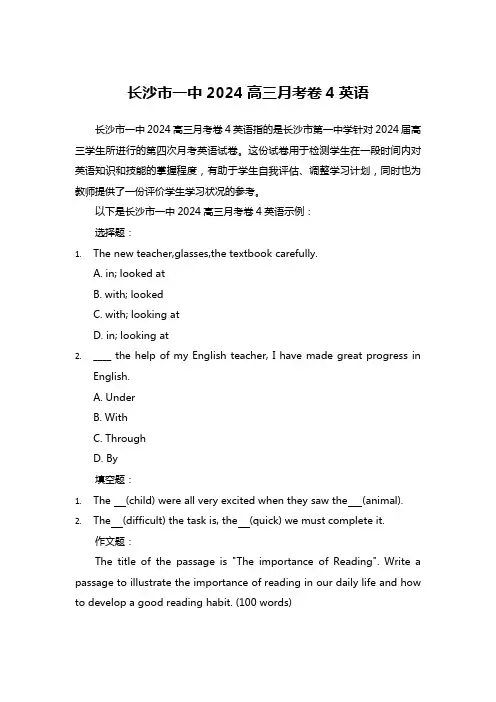
长沙市一中2024高三月考卷4英语长沙市一中2024高三月考卷4英语指的是长沙市第一中学针对2024届高三学生所进行的第四次月考英语试卷。
这份试卷用于检测学生在一段时间内对英语知识和技能的掌握程度,有助于学生自我评估、调整学习计划,同时也为教师提供了一份评价学生学习状况的参考。
以下是长沙市一中2024高三月考卷4英语示例:选择题:1.The new teacher,glasses,the textbook carefully.A. in; looked atB. with; lookedC. with; looking atD. in; looking at2.____ the help of my English teacher, I have made great progress inEnglish.A. UnderB. WithC. ThroughD. By填空题:1.The (child) were all very excited when they saw the (animal).2.The (difficult) the task is, the (quick) we must complete it.作文题:The title of the passage is "The importance of Reading". Write a passage to illustrate the importance of reading in our daily life and how to develop a good reading habit. (100 words)总结:长沙市一中2024高三月考卷4英语指的是长沙市第一中学针对2024届高三学生所进行的第四次月考的英语试卷。
该试卷由选择题、填空题和作文题等题型组成,用于评估学生在一段时间内的英语学习和进步情况。
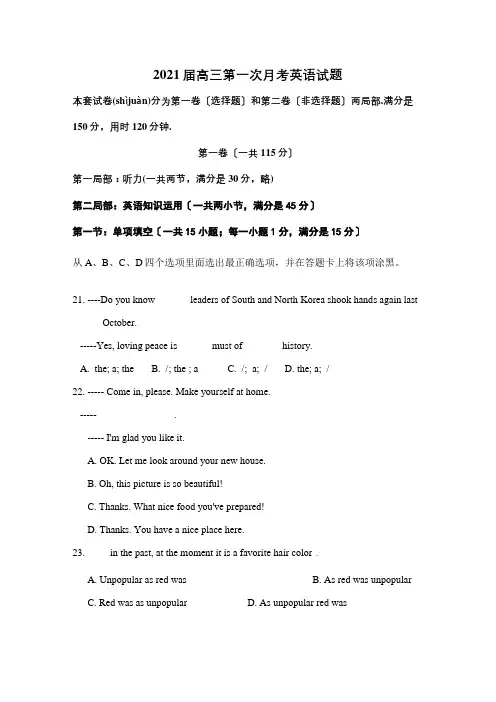
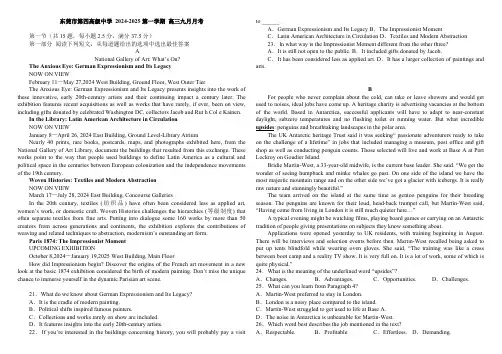
东莞市第四高级中学2024-2025第一学期高三九月月考第一节(共15题,每小题2.5分,满分37.5分)第一部分阅读下列短文,从每道题给出的选项中选出最佳答案ANational Gallery of Art: What’s On?The Anxious Eye: German Expressionism and Its LegacyNOW ON VIEWFebruary 11—May 27,2024 West Building, Ground Floor, West Outer TierThe Anxious Eye: German Expressionism and Its Legacy presents insights into the work of these innovative, early 20th-century artists and their continuing impact a century later. The exhibition features recent acquisitions as well as works that have rarely, if ever, been on view, including gifts donated by celebrated Washington DC, collectors Jacob and Rut h Col e Kainen.In the Library: Latin American Architecture in CirculationNOW ON VIEWJanuary 8—April 26, 2024 East Building, Ground Level-Library AtriumNearly 40 prints, rare books, postcards, maps, and photographs exhibited here, from the National Gallery of Art Library, document the buildings that resulted from this exchange. These works point to the way that people used buildings to define Latin America as a cultural and political space in the centuries between European colonization and the independence movements of the 19th century.Woven Histories: Textiles and Modern AbstractionNOW ON VIEWMarch 17—July 28, 2024 East Building, Concourse GalleriesIn the 20th century, textiles (纺织品) have often been considered less as applied art, women’s work, or domestic craft. Woven Histories challenges the hierarchies (等级制度) that often separate textiles from fine arts. Putting into dialogue some 160 works by more than 50 creators from across generations and continents, the exhibition explores the contributions of weaving and related techniques to abstraction, modernism’s outstanding art form.Paris 1874: The Impressionist MomentUPCOMING EXHIBITIONOctober 8,2024—January 19,2025 West Building, Main FloorHow did Impressionism begin? Discover the origins of the French art movement in a new look at the basic 1874 exhibition considered the birth of modern painting. Don’t miss the unique chance to immerse yourself in the dynamic Parisian art scene.21.What do we know about German Expressionism and Its Legacy?A.It is the cradle of modern painting.B.Political shifts inspired famous painters.C.Collections and works rarely on show are included.D.It features insights into the early 20th-century artists.22.If you’re interested in the buildings concerning history, you will probably pay a visit to ______.A.German Expressionism and Its Legacy B.The Impressionist MomentC.Latin American Architecture in Circulation D.Textiles and Modern Abstraction23.In what way is the Impressionist Moment different from the other three?A.It is still not open to the public. B.It included gifts donated by Jacob.C.It has been considered less as applied art. D.It has a larger collection of paintings and arts.BFor people who never complain about the cold, can take or leave showers and would get used to noises, ideal jobs have come up. A heritage charity is advertising vacancies at the bottom of the world. Based in Antarctica, successful applicants will have to adapt to near-constant daylight, subzero temperatures and no flushing toilet or running water. But what incredible upsides: penguins and breathtaking landscapes in the polar area.The UK Antarctic heritage Trust said it was seeking“ passionate adventurers ready to take on the challenge of a lifetime” in jobs that included managing a museum, post office and gift shop as well as conducting penguin counts. Those selected will live and work at Base A at Port Lockroy on Goudier Island.Bridie Martin-West, a 33-year-old midwife, is the current base leader. She said. “We get the wonder of seeing humpback and minke whales go past. On one side of the island we have the most majestic mountain range and on the other side we’ve got a glacier with icebergs. It is really raw nature and stunningly beautiful.”The team arrived on the island at the same time as gentoo penguins for their breeding season. The penguins are known for their loud, head-back trumpet call, but Martin-West said, “Having come from living in London it is still much quieter here…”A typical evening might be watching films, playing board games or carrying on an Antarctic tradition of people giving presentations on subjects they know something about.Applications were opened yesterday to UK residents, with training beginning in August. There will be interviews and selection events before then. Martin-West recalled being asked to put up tents blindfold while wearing oven gloves. She said, “The training was like a cross between boot camp and a reality TV show. It is very full on. It is a lot of work, some of which is quite physical.”24.What is the meaning of the underlined word “upsides”?A.Changes. B.Advantages. C.Opportunities. D.Challenges. 25.What can you learn from Paragraph 4?A.Martin-West preferred to stay in London.B.London is a noisy place compared to the island.C.Martin-West struggled to get used to life at Base A.D.The noise in Antarctica is unbearable for Martin-West.26.Which word best describes the job mentioned in the text?A.Respectable. B.Profitable. C.Effortless. D.Demanding.27.What does the text mainly tell us?A.Adventurers are called on to enjoy endless fun.B.Antarctic jobs concerning penguins are easy.C.Unique Antarctic Jobs with highlights are waiting for adventurers.D.The chance has come for people to explore the cold and wild world.CThe launch of a tool to record a vanishing Greek dialect drew attention back this week to one of the great extinctions of the modern world: nine languages are believed to be disappearing every year. Romeyka, which is spoken by an ageing population of a few thousand people in the mountain villages near Turkey’s Black Sea coast, separated from modern Greek thousands of years ago. It has no written form. For linguists, it is a“ living bridge” to the ancient Greek world, the loss of which would clearly be a blow.But some languages are in even bigger trouble, with 350 that have fewer than 50 native speakers and 46 that have just one. A cooperation between Australian and British institutions paints the situation in distinct colours, with a language stripes chart, devised to illustrate the accelerating decline in each decade between 1700 and today. Its authors predict that between 50% and 90% of the world’s 7,000 languages will be extinct by 2150. Even now, half of the people on the planet speak just 24 of them.The history of languages has always been linked to colonialism (殖民主义) and political persecution (迫害), which scatter populations as well as controlling them. The Endangered Languages Alliance (ELA) has tracked down and mapped hundreds of dying languages in New York, which is an unexpected discovery. These dialects are supposed to be found in remote rural areas. Among ELA’s more shocking discoveries is that, of 700 surviving speakers of Seke, which originated in a cluster of mountain villages in Nepal, more than 150 can be traced to two apartment buildings in Brooklyn district of New York.From Sami reindeer herders across the Arctic to Australia’s Indigenous (土著的) peoples, the ways in which people express themselves hide secret messages about ancient ways of living in nature. Both a will and a way are needed if they are to survive. By simply honouring their existence, linguists play an important role. Ken Hale, an activist who is strongly for preserving endangered languages famously argued that losing any language was “like dropping a bomb on the Louvre”.28.What does “Romeyka” in Paragraph 1 refer to?A.An extinct ancient Greek language.B.A language with very few written words.C.A disappearing dialect related to ancient Greek.D.A popular dialect loved by the young generation.29.Why are the numbers used in Paragraph 2?A.To show the importance of the dialects.B.To conclude the diversity of the dialects. C.To explain different ways to protect dialects.D.To illustrate the tendency of fast dying dialects.30.What can we infer from Paragraph 3?A.Seke is a place in the mountains of Nepal.B.People assume fewer dialects exist in big cities.C.Nepal and New York were twin cities many years ago.D.ELA is not surprised to trace an original Nepal dialect to Brooklyn.31.What does Ken Hale’s quote mean?A.The extinction of a dialect is a great loss.B.Bombing Louver is a disaster to any language.C.Ancient ways of living are kept secret in Louvre.D.Languages are to survive simply by honoring them.DHave you ever worried that you might smell bad? Well, you do have a smell, but not in the way you think. The human body releases hundreds of chemical compounds into the air every day, and these compounds reveal much more than just our health habits; they can also indicate our health situations.In 1971, chemist Linus Pauling identified 250 different gaseous chemicals in our breath, known as VOCs. These VOCs originate from the body’s metabolic (新陈代谢) processes and are excreted (排泄) through skin glands. While sweat contributes to these VOCs, it only accounts for a small portion of them.VOCs can reveal a lot about our health. For example, a sweet-smelling breath could be a sign of diabetes. Besides breath, VOCs are also released from our skin, and feces (粪便). A notable case involved Joy Milne, who noticed a change in her husband’s scent 12 years before he was diagnosed with Parkinson’s disease. Known as “the woman who can smell Parkinson’s,” Joy has been using her keen sense of smell to help scientists develop a simple swab test to diagnose the illnesses.Animals with advanced sense of smell, like dogs, have demonstrated they can detect various types of cancer in humans. Although these scents are often undetectable to the human nose, they provide evidence that our bodies emit different scents when something is wrong.The relationship between VOCs, and our health is still being studied. Studies have already shown that they can predict a person’s age within a few years based on their skin VOC profile. In one interview, Professor Morin stated, “We are at a relatively early stage in this research area, but we have already distinguished males from females based on the acidity of skin VOCs. We believe skin VOCs can reveal aspects of who we are, such as nutrition, health and stress. These signatures likely contain markers that can be used to diagnose disease.”So, who knows—maybe one day we will be able to detect diseases simply by breathing into a device.32.What do we learn about the VOCs according to the text?A.The VOCs are primarily composed of sweat.B.Skin VOCs reveal more about our health habits.C.Our body’s metabolic processes are the source of VOCs.D.VOCs only released from our skin indicate health status.33.Why does the author mention animals in paragraph 4?A.To argue we should rely more on animals.B.To show the superior intelligence of animals.C.To highlight VOCs’ potential as diagnostic markers.D.To illustrate VOCs have the capability to cure cancers.34.What future technology might arise from the understanding of VOCs?A.Devices that can breathe out disease-causing VOCs.B.Equipment that can analyze VOCs to diagnose diseases.C.Personalized perfumes that can mask disease-related VOCs.D.Advanced facilities that can use VOCs to cure diseases.35.Which can be a suitable title for the passage?A.The Role of Sweat in Human Health B.Linus Pauling’s Contributions to VOCS C.Smell of Body Contributing to Diseases D.Detecting Diseases through Body Scents第二节(共5小题;每小题2.5分,满分12.5分)根据短文内容,从短文后的选项中选出能填入空白处的最佳选项。

高三英语月考试卷第一卷(选择题共85分)第二部分:单项填空(共15小题;每小题1分,满分15分)21. The tour will provide __________ unique opportunity for you to live with a British family for a week in __________ hope that you will have a better understanding of the UK.A. a; 不填B. an; 不填C. a; theD. an; the22. it's hard to say what kind of person he is. Sometimes he is very friendly; at other times he ____ be very cold.A. canB. mustC. willD. shall23. Chances are high__________ China and Russia will make an agreement to build an oil pipeline.A. whenB. whereC. thatD. which24. The local government in Shenzhen has recently passed a new regulation forbidding supermarkets and stores to _________ free plastic bags to shoppers, in a bid to protect the environment.A. give offB. give inC. give upD. give out25. --- Have you got the results of the final exam?--- Not yet. It will be a few days _________ we know the full results,A. beforeB. afterC. untilD. when26. --- Sorry to interrupt you. Please go on.--- Where was I?--- You ________ you didn't like going to college in Hongkong.A. had been sayingB. had saidC. saidD. were saying27. ____________ of the people on the net China's economy is among the strongest in the world.A. Four-fifth; believesB. Four-fifth; believeC. Four-fifths; believeD. Four-fifths; believes28. The engine of 'the bus was out of order and the bad weather ________ the worries of the passengers.A. added upB. added toC. resulted fromD. made of29. On Saturday evenings guests are entertained in the garden, weather_________.A. permitsB. permitC. permittingD. permitted30. ____________ understanding the challenges faced by the world's poorest people can we expect a new future free of extreme poverty and hunger.A. OnB. ThroughC. OnlyD. Only by31. --- How shall we spend the weekend?--- If you ______ a day trip to the coast, the pleasant seaside town of Brighton is only 20 miles away.--- That's wonderful! Let s go there.A. will like takingB. will like to takeC. feel tike takingD. feel like to take32. ___________ on the MSN, some people often use '88' for 'good-bye'.A. When chatB. When chattingC. When chattedD. When to chat33. I feel uncomfortable each time I remember the situation ____________ Mary didn't agree with me ___________ the matterA. that: atB. in which; overC. which; aboutD. where; to34. It is very _______________ of you to notice that detail straightaway.A. sharpB. enthusiasticC. eagerD. aware35. --- Will it snow any more?--- _____________, We have had enough this year.A. I hope soB. I hope notC. I think soD. I think not第三部分完形填空(共20小题;每小题1分,-满分20分)A taxi driver taught me a million dollar lesson in customer satisfaction and expectation. Motivational speakers charge thousands of dollars to pass 36 this kind of training to business managers and staff. It 37 me only a $12 taxi ride.I had 38 into Dallas for the sole purpose of calling on a customer. Time was of great importance and my plan included a 39 turnaround trip from and back to the airport. A spotless taxi pulled 40 . The driver rushed to open the passenger door for me and made sure I was 41 seated 42 he closed the door. As he got in the driver's seat, he mentioned that the neatly folded Wall Street Journal next to me was for my use. He 43 showed me several tapes and asked me what type of music I would enjoy. Well! I looked around for a "Watching Camera!" Wouldn't you?I could not believe the service I was 44 ! I took the opportunity to say, "Obviously you take great 45 in your work. You must have a story to tell" "You bet," he replied, "I used to be in Commercial America. But I 46 that, thinking my best would never be good enough. I decided to find my position in life 47 I could feel proud of being the best I could be. I knew I would never be a rocket scientist, but I love driving cars, being 48 help to others and feeling like I have done a full day's work and done it well. I evaluate my 49 possessions and… wham! I became a taxi driven. One thing I know for 50 is that to be good in my business I can simply just 51 the expectations of my passengers. 52 , to be great in my business, I have to go beyond the 53 expectations! I like both the sound and the return of being 'great' 54 than just getting by on 'average'".Did I tip him without hesitation? You bet! Commercial America's 55 is the traveling folk's friend!36. A. by B. away C. on D. into37. A. spent B. cost C. wasted D. paid38. A. driven B. ridden C. flown D. entered39. A. quick B. happy C. long D. far40. A. up B. out C. about D. back41. A. finally B. carefully C. immediately D. comfortably42. A. after B. when C. before D. as43. A. therefore B. then C. indeed D instead44. A. receiving B. accepting C. suffering D. offering45. A. satisfaction B. part C. pride D. efforts46. A. became used to B. got tired of C. felt interested in D. was filled with47. A. when B. how C. where D. that48. A. of B. on C. in D. w4th49. A. individual B. single C. only D. personal50. A. use B. sure C. discussion D. memory51. A. welcome B. know C. meet D. notice52. A. Instead B. However C. Besides D. Moreover53. A. bosses' B. drivers' C. cars' D. customers'54. A. less B. worse C. better D. fewer55. A. fortune B. luck C. loss D. chance第三部分阅读明白得(共15小题;每小题2分,满分30分)ABEIJINCG, Feb. 28, 2008 (Xinhua) -- China plans to carry out its first spacewalk in second half of the year, an official of the nation's manned space program said here on Thursday.The Shenzhou VII spacecraft will be launched from the Jiuquan Satellite Launch Center in the northwestern province of Gansu late in the year and the astronauts will leave their spaceship for the first time, the official told Xinhua.Compared with the previous two manned space flights, the upcoming Shenzhou VII space mission is more complex. Besides the spacewalk, the crew is also expected to perform extra-vehicular work such as fixing and tightening equipment. The spaceship will also release a small inspection satellite, which keeps an eye on its own performance.China may live broadcast the first ever spacewalk. "The Shenzhou VII spaceship is able to live-broadcast the walk, but it has not been decided whether the spacewalk will be broadcast in a live or recorded version," the official told Xinhua.Breakthroughs have been made in significant techniques related to the spacewalk. Research into the development of spaceship and rockets has been going smoothly, and astronauts have undertaken extensive training, according to the official.The Shenzhou VII mission will start the second phase of China's three-stage space program. said the official.In the second stage, China plans further breakthroughs in manned space flight, such as space walks. In this phase, China will put into orbit a space laboratory staffed by humans for short periods and create a fully-equipped space engineering system.In the third stage, China will build a permanent space station and a space engineering system. Astronauts and scientists will travel between the Earth and the space station to conduct large-scale experiments.56. The news mainly tells its readers that _______.A. China intends to conduct a spacewalk for the first timeB. China plans to launch her third manned space flightC. China tries to live broadcast her first-time spacewalkD. China prepares to start her third-stage space program57. What is included in the second stage of China's three-stage space program?A. Creating an ever-lasting space station for astronauts.B. Placing a man-staffed lab into orbit for long periods.C. Carrying out large-scale experiments in laboratories.D. Setting up a fully-equipped space engineering System.58. Which is true according to the passage?A. Important technique about spacewaik remain uncertain in spite of researches.B. spacewalk is the only factor that leads to Shenzbou VII mission's complexity.C. Due to Shenzhou VIPs inability, it's uncertain how to broadcast the spacewalk.D. Our. country is getting along quite well with developing spaceship and rockets,BAmong the crowd of Olympian gods the most famous one was Apollo. He was the son of Zeus and Letto. According to Greek mythology, Letto was driven by Hera, Zeus' wife, from land to land and at last Poseidon took pity on her and Brought the island of Delos out of water for her to live on. There she gave birth to the twins, Apollo and Artemis.Wearing a purple robe, Apollo usually sat in his bright eastern palace early in the morning and made ready to start his daily journey across the sky. During the day he drove his carriage of gold and ivory(象牙), and brought light, life and love m the great world below. In the afternoon he came to the end of his journey in the far western sea and got on his golden boat to return to his eastern home.Apollo was the god of music and poetry. He could bring about all feelings, which are expressed in his noble songs. With his gold musical instrument and the sweet accents of his godlike voice he led the choir of the muses(音乐女神们) at Olympus. The pleasant music was so exciting that stones marched into their places of their own will in musical time when he helped Poseidon build up the walls of Troy(特洛伊城). On one occasion, invited to a contest by the human musician Marsyas, he won and then flayed(剥……的皮) him to death for his pride. On another occasion, he lost at a musical contest and turned the ears of the judge, King Midas, into those of an ass(驴子).Apollo stood for youthful and manly beauty. His golden hair, stately manner and air all combined to make him the admiration of the world. A beautiful girl, by the name of Clytle, was so fond of his beauty and glory that from dawn to dusk she knelt on the ground, her hands outstretched towards the sun god, and her eyes looked at his golden wheeled carriage racing across the blue sky. Though her love was not returned, she had never changed her mind aboutApollo, The gods were moved at the sad sight, and Changed her into a sunflower.59. What does Apollo's carriage most probably look like?60. What is the author's attitude towards Apollo?A. He speaks highly of Apollo.B. He looks down upon Apollo.C. He doesn't show his attitude towards Apollo.D. He admires Apollo very much.61. We can infer from the passage that _________.A. Apollo loved Clytle so much that he turned her into a sunflowerB. Apollo was a god of both virtues and shortcomingsC. But for Apollo's help, Troy couldn't have been built upD. Apollo was not good at singing but loved singing very much62. The purpose of this passage is ____________.A. to explain how Apollo's manly beauty impressed file worldB. to introduce a well-known Olympian godC. to tell how Apollo came into beingD. to show the importance of doing good deeds for othersC●Formula One Car Racing was hit by McLaren spy controversy.●David Beckham left Real Madrid for Las Angeles Galaxy of the Major League Soccer.●The National Basketball Association (NBA) was involved in gambling.●Men's 100-meter world record was revised.Asafa Powell of Jamaica lowered the world 100-meter record with a time of 9.74 seconds in Italy in September. He had previously shared the record of 9.77 with American Olympic champion Justin Gatlin.●Germany defended their title at the Women's World Cup.Germany became the first team in history to defend the title at the Women's World Cup after beating Brazil 2-0 in the final on Sept. 30.●American track atl01ete Marion Jones admitted that she had used steroids(类固醇类药物) in therun-up to the 2000 Sydney Olympics.Jones was then stripped of the five medals, including three golds she won in Sydney, and banned for two years.●FIFA ended its policy of rotating(使轮番) the hosting of World Cups through its six continentalconfederations from the 2020 World Cup finals.●The World Anti Doping Agency (WADA) presented its new anti-drug rules aimed at strictlypunishing drug-takers but also offering mercy for accidental drug-taking.●Swiss Roger Federer still ruled the tennis world.For the third time in four years, Federer walked away with three of the four majors.●Brazilian men's volleyball team got their 10th world-level crown in seven years after defendingWorld Cup title in December.63. Which country, should you go to if you want to watch David Beckham's league matches on the spot?A. America.B. Spain.C. Britain.D. Germany.64. What does the underlined word "stripped" most probably mean?A. To remove one's clothes, either completely or to a particular extent.B. To take off a covering, or take the covering off something.C. To separate one or more components from a solution (溶液) or mixture.D. To take status or possessions or titles away from somebody.65. Which is true according to the passage?A. Asafa Powell became a world record keeper for the first time.B. It was the first time that Germany won the Women's World Cup.C. Accidental drug--takers might not be punished~ strictly by WADA.D. Roger Federer missed three of four majors for the third time.66. What might be the best title of this news report?A. Top 10 world-popular sportsmen in 2007.B. Top 10 world spoons breakthroughs in 2007.C. Top 10 world sports records in 2007.D. Top 10 world sports news stories in 2007.DThe right to pursue happiness is issued to us all with our birth, but no one seems quite sure what it is.A holy man in India may think that happiness is in himself. It is in needing nothing from outside himself. In wanting nothing, he lacks nothing. We westerners, however, are taught that the more we have from outside ourselves, the happier we will be, and then we are made to want. We are even told it is our duty to want. Advertising, one of our major industries, exists not to satisfy these de, sires but to createthem--and to create them faster than any man's money in his pocket can satisfy them. Here, obviously someone is trying to buy the dream of happiness and spending millions upon millions every year in the attempt. Clearly the happiness-market is not running out of customers.I doubt the holy man's idea of happiness, ,and I doubt the dreams of the happiness-market, too. Whatever happiness may be, I believe, it is neither in having nothing nor in having more, but in changing--in changing the world and mankind into pure states.To change is to make efforts to deal with difficulties. As Yeats, a great Irish poet once put it, happiness we get for a lifetime depends on how high We choose our difficulties. Robert Frost, a great American poet, was thinking in almost the stone terms when he spoke of "the pleasure of taking pains."It is easy to understand. We even demand difficulty for the fun in our games. We demand it because without difficulty there can be no game. And a game is a way of making something hard for the fan of it. The rules of the game are man-made difficulties. When the player ruins the fun, he always does so by refusing to play by the roles. It is easier to win at chess if you are free, at your pleasure, to cast away all the rules, but the fun is in winning within the rules.The same is true to happiness. The buyers and sellers at the happiness-market seem to have lost their sense of the pleasure of difficulty. Heaven knows what they are playing, but it seems a dull game. And the Indian holy man seems dull to us, I suppose, because he seems to be refusing to play anything at all.The western weakness may be in the dreams that happiness can be bought while the eastern weakness may be in the idea that there is such a thing as perfect happiness in man himself. Both of them forget a basic fact: no difficulty, no happiness.67. Who shares the same idea of happiness with the author.?A. The Indian holy man.B. The great Irish poet Yeats.C. Advertisers.D. The buyers and sellers at the happiness-market.68. What does "happiness-market" mean in the second paragraph?A. It means a place in which people can buy brings happily.B. It means a market which lacks happy customers.C. It means a pure state for the world and mankind.D. It means a market where people try to buy happiness with money.69. According to the passage, which of the following is right?A. The Indian holy man is much happier than westerners.B. The westerners understand happiness better than the Indian holy man.C. There is no fun without playing by the rules.D. Both the eastern weakness and western Weakness are for the same reason.70. What does the author do in the fifth paragraph?A. He supports a point of view with an example.B. He argues against a point of view.C. He introduces a point of view.D. He tries to understand a point of view.第二卷(非选择题,共两大题,35分)第五部分任务型阅读(共10小题,每小题1分;满分10分)请认真阅读下面短文,并依照所读内容在文章后表格中的空格里填上一个最恰当的单词。
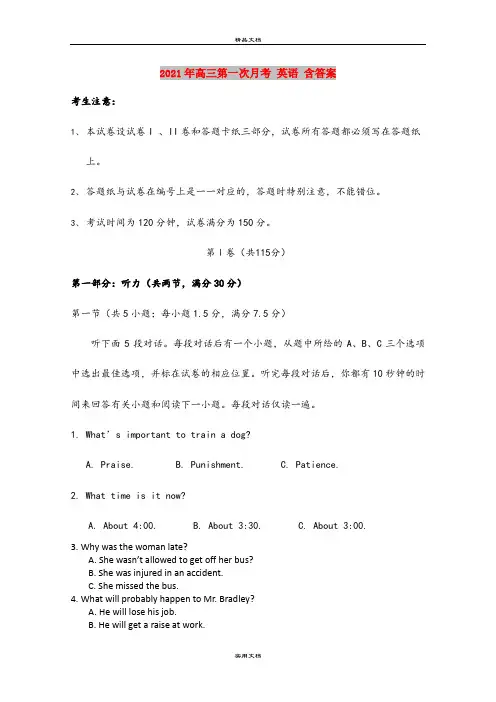
2021年高三第一次月考英语含答案考生注意:1、本试卷设试卷I 、II卷和答题卡纸三部分,试卷所有答题都必须写在答题纸上。
2、答题纸与试卷在编号上是一一对应的,答题时特别注意,不能错位。
3、考试时间为120分钟,试卷满分为150分。
第Ⅰ卷(共115分)第一部分:听力(共两节,满分30分)第一节(共5小题;每小题1.5分,满分7.5分)听下面5段对话。
每段对话后有一个小题,从题中所给的A、B、C三个选项中选出最佳选项,并标在试卷的相应位置。
听完每段对话后,你都有10秒钟的时间来回答有关小题和阅读下一小题。
每段对话仅读一遍。
1.What’s important to train a dog?A. Praise.B. Punishment.C. Patience.2. What time is it now?A. About 4:00.B. About 3:30.C. About 3:00.3. Why was the woman late?A. She wasn’t allowed to get off her bus?B. She was injured in an accident.C. She missed the bus.4. What will probably happen to Mr. Bradley?A. He will lose his job.B. He will get a raise at work.C. His working hours will be cut in half.5. What do we know about the man?A. He has failed history twice.B. He has never taken history before.C. He won’t accept the woman’s help.第二节(共15小题;每小题1.5分,满分22.5分)听第6段材料,回答第6至7题。
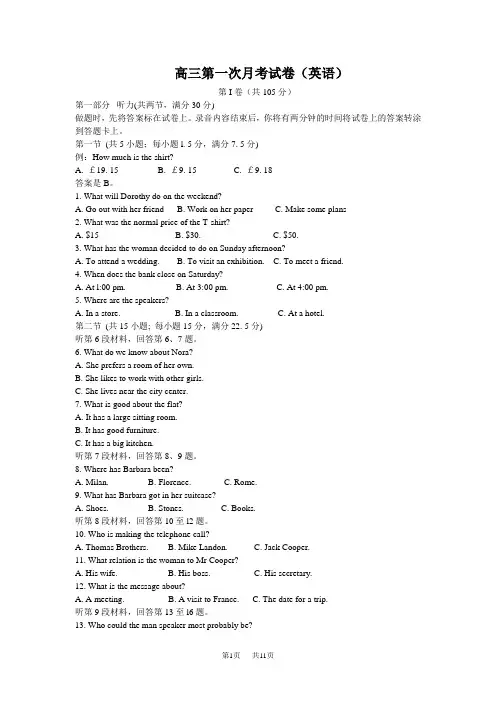
高三第一次月考试卷(英语)第I卷(共105分)第一部分听力(共两节,满分30分)做题时,先将答案标在试卷上。
录音内容结束后,你将有两分钟的时间将试卷上的答案转涂到答题卡上。
第一节(共5小题;每小题l. 5分,满分7. 5分)例:How much is the shirt?A. £19. 15B. £9. 15C. £9. 18答案是B。
1. What will Dorothy do on the weekend?A. Go out with her friendB. Work on her paperC. Make some plans2. What was the normal price of the T-shirt?A. $15B. $30.C. $50.3. What has the woman decided to do on Sunday afternoon?A. To attend a wedding.B. To visit an exhibition.C. To meet a friend.4. When does the bank close on Saturday?A. At l:00 pm.B. At 3:00 pm.C. At 4:00 pm.5. Where are the speakers?A. In a store.B. In a classroom.C. At a hotel.第二节(共15小题; 每小题15分,满分22. 5分)听第6段材料,回答第6、7题。
6. What do we know about Nora?A. She prefers a room of her own.B. She likes to work with other girls.C. She lives near the city center.7. What is good about the flat?A. It has a large sitting room.B. It has good furniture.C. It has a big kitchen.听第7段材料,回答第8、9题。
2020-2021学年广东实验中学高三下学期第一次月考英语试卷英语试题注意事项:1.答卷前,考生务必将自己的姓名、考生号、考场号、座位号填写在答题卡上。
2.回答选择题时,选出每小题答案后,用铅笔把答题卡上对应题目的答案标号涂黑。
如需改动,用橡皮檫干净后,再选涂其他答案标号。
回答非选择题时,将答案写在打题卡上,写在试卷上无效。
3.考试结束后,将本试卷和答题卡一并交回。
第一部分听力(共两节,满分30分)做题时,先将答案标在试卷上。
录音内容结束后,你将有两分钟的时间将试卷上的答案转涂到答题卡上。
第一节(共5小题;每小题1.5分,满分7.5分)听下面5段对话。
每段对话后有一个小题,从题中所给的A、B、C三个选项中选出最佳选项。
听完每段对话后,你都有10秒钟的时间来回答有关小题和阅读下一小题。
每段对话仅读一遍。
例:How much is the shirt?A. £19.15.B. £9.18.C. £9.15.答案是C。
1.What does John find difficult in learning German?A.Pronunciation.B.V ocabulary.C.Grammar.2.What is the probable relationship between the speakers?A.Colleagues.B.Brother and sister.C.Teather and student.3.Where does the conversation probably take place?A.In a bank.B.At a ticket coffee.C.On the train.4.What are the speakers talking about?A.A restaurant.B.A street.C.A dish.5.How does the woman think of her interview?A.It was tough.B.It was interesting. C. It was successful.第二节(共5小题;每小题1.5分,满分22.5分)听下面5段对话或独白。
上饶市一中2023-2024学年高三上学期第一次月考英语试卷考试时间:2023年10月考试时长:120分钟满分:150分命题人:陈桃英、许苗注意事项:1.答卷前,考生务必将自己的姓名、准考证号填写在答题卡上。
2.回答选择题时,选出每小题答案后,用2B铅笔把答题卡上对应题目的答案标号框涂黑。
如需改动,用橡皮擦干净后,再选涂其它答案标号框,回答非选择题时,将答案写在答题卡上,写在本试卷上无效。
3.考试结束后,上交答题卡。
第一部分:听力(共两节,每小题1.5分满分30分)第一节听下面5段对话。
每段对话后有一个小题,从题中所给的A、B、C三个选项中选出最佳选项,并标在试卷的相应位置。
听完每段对话后,你都有10秒钟的时间来回答有关小题和阅读下一小题。
每段对话仅读一遍。
1.Which country did the woman go?A.France.B.China.C.South Korea.2.Who will move to a new place?A.Kitty.B.Roger.C.Ann.3.When should the plans be handed in at the latest?A.On Tuesday afternoon.B.On Thursday afternoon.C.Before Tuesday afternoon. 4.What are the speakers doing?A.Practicing a play.B.Taking a walk downtown.C.Filming a movie scene.5.What can we learn about the woman?A.She isn’t a local.B.She is trying to park her car.C.She didn’t see the sign.第二节听下面5段对话或独白,每段对话或独白后有几个小题,从题中所给的A、B、C三个选项中选出最佳选项,并标在试卷的相应位置。
黄梅县育才高级中学高三9月月考英语(考试时间:120分钟试卷满分:150分)第一部分听力(共两节,满分30 分)做题时,请先将答案标在试卷上。
录音内容结束后,你将有两分钟的时间将试卷上的答案转涂到答题卡上。
第一节(共5小题;每小题1.5分,满分7.5分)听下面5段对话。
每段对话后有一个小题,从题中所给的A、B、C 三个选项中选出最佳选项。
听完每段对话后,你都有10秒钟的时间来回答有关小题和阅读下一小题。
每段对话仅读一遍。
1.What will the man probably doA.Visit Bill. B.Play tennis. C.Go swimming.2.What time is Alex supposed to arriveA.At 8:00. B.At 7:30. C.At 8:15.3.Where will the speakers probably spend their vacationA.In China. B.In Italy. C.In Korea.4.Which color MP4 player does the man wantA.Green. B.Brown. C.Blue.5.What is the man doingA.Making an apology. B.Making an invitation. C.Offering help. 第二节(共15小题;每小题1.5分,满分22.5分)听下面 5 段对话或独白。
每段对话或独白读两遍。
听下面一段较长对话,回答以下小题。
6.Where are the speakersA.At the counter. B.On the plane. C.At the airport. 7.When will the plane get to Paris possibly A.10:00. B.11:40. C.10:40.听下面一段较长对话,回答以下小题。
绝密★启用前天津市武清区大良中学2018-2019学年度高三上学期第一次月考试题英语本试卷分为第I卷(选择题)和第II卷(非选择题)两部分,共130分,考试用时100分钟。
第I卷1至10页,第II卷11至12页。
答卷前,考生务必将自己的姓名、准考号填写在答题卡上,并在规定位置粘贴考试用条形码。
答卷时,考生务必将答案涂写在答题卡上,答在试卷上的无效。
考试结束后,将本试卷和答题卡一并交回。
祝各位考生考试顺利!英语笔试第I卷注意事项:1. 每小题选出答案后,用铅笔将答题卡上对应题目的答案标号涂黑。
如需改动,用橡皮擦干净后,再选涂其他答案标号。
2. 本卷共55小题,共95分。
第一部分:英语知识运用(共两节,满分45分)第一节:单项填空(共15小题;每小题1分,满分15分)从A、B、C、D四个选项中,选出可以填入空白学#科网处的最佳选项。
例:Stand over there___________ you’ll be able to see it better.A. orB. andC. butD. while答案是B。
1. The movie Wolf Warrior II positive reviews since it was released.A. receivesB. has receivedC. receivedD. had received2. that it was going to rain, James took a raincoat with him.A. SeeingB. SawC. SeenD. To see3. Yuan Longping has won many awards, shows his extraordinary achievements.A. whatB. thatC. whoD. which4. My wallet is no longer in use. I can buy I want simply with WeChat Pay.A. whoeverB. whicheverC. whateverD. whenever5. In 1938, Pearl S. Buck became the first American woman the Nobel Prize for Literature.A. winningB. winC. wonD. to win6. —I’m sorry. I at you the other day.—Forget it. I was a bit out of control myself.A. shouldn’t shoutB. shouldn’t have shoutedC. mustn’t shoutD. mustn’t have shouted7. Though of the danger, Mr. Brown still risked his life to save the boy in the fire.A. having toldB. tellingC. to be toldD. told8. —Have you moved into the new house?—Not yet. It .A. has been builtB. was builtC. is being builtD. had been built9. I believe the time is coming soon there will be no weapons in the world.A. whichB. thatC. whereD. when10. you have finished your homework, you can have a rest.A. Now thatB. As ifC. In caseD. Even if11. —Mary will not attend the party tonight.—But she she would!A. has promisedB. promisedC. will promiseD. promises12. Please call me before 10am next Monday. I classes after 10am.A. would haveB. have hadC. will haveD. had13. is going to do the job will be decided in tomorrow’s meeting.A. WhichB. ThatC. WhatD. Who14. If he more careful, he would have got much better results in the finals.A. had beenB. wasC. has beenD. were15. When reading the lines, readers can connect the literature to their own experience.A. withB. forC. beyondD. on第二节:完形填空(共20小题;每小题1.5分,满分30分)阅读下面短文,掌握其大意,然后从16~35各题所给的A、B、C、D四个选项中,选出最佳选项。
巨野一中高三第一次月考英语试题命题人:别华亮吴美丽2015.9注意事项:1本试卷分第I卷(选择题)和第II卷(非选择题)两部分。
2答题前,考生务必将自己的姓名、准考证号填写在本试卷相应的位置。
3.全部答案在答题卡上完成,答在本试卷上无效。
4.考试结束后,将本试卷和答题卡一并交回。
第I卷第一部分听力(共两节,满分30分)做题时,先将答案标在试卷上。
录音内容结束后,你将有两分钟的时间将试卷上的答案转涂到答题卡上。
第一节(共5小题;每小题1.5分,满分7.5分)听下面5段对话。
每段对话后有一个小题,从题中所给的A、B、C三个选项中选出最佳选项,并标在试卷的相应位置。
听完每段对话后,你都有10称钟的时间来回答有关小题如阅读下一小题。
每段对话仅读一遍。
例:How much is the shirt?A. £19.15.B. £9.18.C. £9.15.答案是C。
1. What does the woman want to do?A. Find a place.B. Buy a map.C. Get an address.2. What will the man do for the woman?A. Repair her car.B. Give her a ride.C. Pick up her aunt.3. Who might Mr. Peterson be?A. A new professor.B. A department head.C. A company director.4. What does the man think of the book?A. Quite difficult..B. Very interesting.C. Too simple.5. What are the speakers talking about?A. Weather.B. Clothes.C. News.第二节(共15小题;每小题1.5分,满分22.5分)听下面5段对话或独白。
第1页 共9页 高三第一次月考试卷 英 语 PART ONE: LISTENING COMPREHENSION (30 points) Section A (22.5 points) Directions: In this section, you will hear six conversations between two speakers. For each conversation, there are several questions and each question is followed by three choices marked A, B and C. Listen carefully and then choose the best answer for each question. You will hear each conversation TWICE. Conversation one 1. Where does the woman want to do? A. To a museum. B. To a post office. C. To a fruit shop. 2. How long will it take the woman to walk to her destination? A. About 5 minutes. B. About 10 minutes C. About 15 minutes Conversation two 3. What was the ticket price the last time the woman took the bus? A. $80. B. $82. C. $84. 4. When does the driver usually begin loading? A. At 1:45. B. At 2:00. C. At 2:15. Conversation three 5. Which bank will the man get money from? A. The Agricultural Bank of China. B. The Bank of Shanghai C. The Bank of China. 6. Where is the bank the man will go to? A. Opposite the shopping mall. B. Next to the shopping mall. C. 50 meters away from the shopping mall. Conversation four 7. What lipstick was the woman looking for? A. A Lyfel in a dark shade. B. A Lyfel in a pink shade. C. A Dior in a bright shade. 8. Why does the woman want to change the color of her lipstick? A. To be cool. B. To look serious. C. To be attractive. 9. How much does the woman pay in total in the end? A. $150. B.$ 160. C. $ 170. Conversation five 10. What course does the man want to take? A. Data processing. B. Camera programming C. Computer programming. 11. When do the classes meet? 第2页 共9页
A. At 7 on Monday evenings. B. At 7 on Thursday evenings. C. At 7 on Monday mornings. 12. How much is the course? A. $130. B. $300. C. $200. Conversation six 13. What has the woman just finished? A. Her last exam. B. Her last lesson. C. Her homework. 14. Where will the art exhibition go next week? A. To New York. B. To Chicago. C. To Boston. 15. What can we learn from the conversation? A. The man bought two tickets this morning. B. The speakers will go to the exhibition tomorrow morning. C. The speakers will go to the exhibition by taxi. Section B (7.5 points) Directions: In this section, you will hear a short passage. Listen carefully and then fill in the numbered blanks with the information you have heard. Fill in each blank with NO MORE THAN THREE WORDS. You will hear the mini-talk TWICE.
Online Anger-Release Stores
They have become very popular with 16 ; now more than 400 online stores are offering anger-release services. In order to attract citizens, the online stores 17 phrases such as “get rid of high pressure”, “Enjoy punishment” or “Best way to relax”.
Price Different stores offer price lists 18 on the time or requirements. Wang Ping’s Opinion To comfort customers, she always gives her own 19 when they are finished talking, complaining or even swearing.
Customers The generation born after 1980 forms the 20 of customers at these stores.
PART TWO: LANGUAGE KNOWLEDGE (45 points) Section A (15 points) Directions: Beneath each of the following sentences there are 4 choices marked A, B, C and D. Choose one answer that best completes the sentence. 21. The clean-up operation at the bullet train crash site in east China's Zhejiang province has been completed. Meantime, trains have resumed services on the railway ______ the accident occurred. A. which B. that C. where D. the place where 22. Thunderstorms have struck northern China, ______ heavy rain and ______ traffic chaos. A. brought, caused B. bringing, causing C. having brought, having caused D. to bring, to cause 23. The toddler who miraculously ______ a fall from her 10th-floor home in Hangzhou, east China, ______ recovering quickly. A. is survived, is B. are survived, are C. survived, is D. being survived, are 24. Many newspaper printed the governor’s statement ______ would resign his position. 第3页 共9页
A. that he B. was that he C. in which he D. and it 25. When I try to understand ______ that prevents so many Americans from being happy as one might expect, it seemed to me that there are two causes. A. why it does B. what it does C. what it is D. why it is 26. Most parents encourage their children to take an active part in social events, ______ those events do not interfere with their studies. A. concerning B. until C. unless D. provided 27. The time is not far away ______ modern communications will become widespread in China’s vast countryside. A. when B. as C. until D. before 28. There is much ______ can be done about the accidents ______ from carelessness. A. which, arose B. that, arising C. which, arisen D. that, arise 29. By the time you get to Beijing tomorrow, I ______ for Shanghai. A. am leaving B. should have left C. will leave D. will have already left 30. There are now many museums showing ______ life was like back then. A. whose B. which C. what D. how 31. Clearly, development aid together with food ______ the long-term solution to the problem of poverty. A. are B. is C. has D. have 32. Europeans made ______ clear that they did not want to take the Roma as neighbors. A. so B. very C. it D. that 33. There they met two Indian monks who were Buddhist masters and ______ as educators without salary. A. were working B. worked C. have work D. had worked 34. You won’t surf the internet before you finish your homework, ______ you? A. do B. don’t C. will D. won’t 35. I wonder why Jack always gets good marks when he does only ______ the others. A. half as much as B. as much as half C. half as many as D. as many as half Section B (18 points) Directions: For each blank in the following passage there are four words or phrases marked A, B, C and D. Fill in each blank with the word or phrases that best fits the context. I grew up poor---living in the housing projects (住房) with six brothers, three sisters, a varying assortment (各式各样东西的混合) of foster kids (养子), my father, and a wonderful mother, Scarlette Hunley. We had little money and few worldly goods, but plenty of love and attention. I was 36 and energetic. I understood that no matter how poor a person was, he could still 37 a dream. My dream was 38 . By the time I was sixteen, I could crush a baseball, and hit anything that moved on the baseball field. I was also 39 : My high school coach Jarvis, who not only believed in me, but taught me how to believe in myself. He 40 me the difference between having a dream and showing conviction (信念). One particular incident with Coach Jarvis changed my life forever. It was the summer between my junior and senior years, and a friend 41 me for a summer job. This meant a chance for money in my pocket—cash for dates with girls, certainly, money for a new bike and new clothes, and the start of savings for a 42 for my mother. The prospect of a summer job was attractive and interesting, and I wanted to jump at the opportunity. Then I